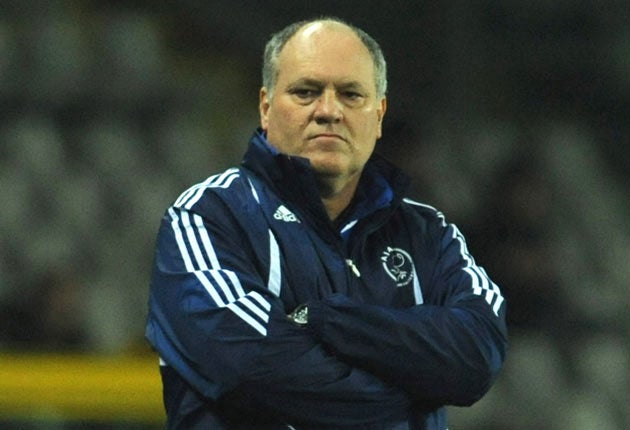Shock horror! Good sense finally returns to top flight

Indigenous adolescents are suddenly the most prized commodity in football. In fact, Fifa insiders reckon that the combined valuation of Phil Jones, Jordan Henderson and Connor Wickham, judiciously distributed in brown envelopes, would suffice to see the 2022 World Cup transferred from Qatar to Helmand Province. Clubs are so concerned about the imminent quota system that they will sign every local teenager who can keep the ball in the air for 10 seconds, so long as they don't actually break any floodlight bulbs.
As though to redress the renewed profligacy of its transfer market, however, the Premier League finds itself in danger of permitting something akin to genuine acumen to intrude elsewhere in its recruitment policy. Fulham have responded to the mysterious delusions of Mark Hughes – namely, that he has ever done anything remotely consistent with the notion that he should manage a Bigger Club – by restoring Martin Jol to the league, and city, where he won so many admirers with Spurs.
Jol was discarded with culpable haste after a poor start to the 2007-08 season, having previously led them to eighth, fifth and fifth. Many Spurs fans were mortified by his treatment, even before Juande Ramos mournfully prolonged their sufferings. Notoriously, only a dodgy batch of lasagne divided Jol's Spurs from the Champions League, where Harry Redknapp has since won such frothy acclaim from his hagiographers. The core of Redknapp's team, moreover, was signed by Jol – including Aaron Lennon, Michael Dawson and, for £5m, Gareth Bale. Along with Dimitar Berbatov, who was also introduced to Britain by Jol, these talents dovetailed both prettily and productively.
Fulham, under Hughes, have not really expanded on the cautious, disciplined foundations of their success under Roy Hodgson. Their central defenders give them a reliable centre of gravity, and an experienced midfield and intimate stadium together compound that solidity. Away from home, however, they have tended to suffer agoraphobia. Given due time and resources, Jol can be expected to introduce a spot of Dutch flair to proceedings.
Hearteningly, there is evidence that other clubs may also be developing some immunity to the vacuous, glamour-addled impatience that continues, for instance, to corrode all self-respect up the road at Chelsea. In approaching Roberto Martinez, Aston Villa showed an acuity that will serve them well in what has become a troubled, troubling quest for a new coach. Martinez, like Jol, has had to learn to deal with football that is nasty, brutish and long – as, say, when away to Stoke on the last day of the season, with relegation at stake. With the cheerful intransigence of youth, however, he remains a zealot of the Guardiola creed, that the most beautiful game is also the most effective.
Yesterday Martinez proved himself a man of principle in other respects, too. To anyone who saw the two men embrace on the pitch at Stoke, his fidelity to Dave Whelan cannot be too much of surprise. Martinez is touchingly immersed in a group, so brittle during his first season at Wigan, that disclosed terrific fortitude in the final weeks of the campaign.
Even so, Villa must be stunned. Wigan is a rugby league town where, despite the cheapest season tickets in the league, tiers of empty seats manifest yawning indifference even to the enchanting Martinez. Yes, Villa are selling Ashley Young, and may lose Stewart Downing as well, having already shed James Milner and Gareth Barry in consecutive summers. But Randy Lerner would presumably have made at least some of the proceeds available, and some day you would like to see how far Martinez might be able to run without his shoelaces tied together.
As it is, Martinez has left Villa at an uncomfortable crossroads. It is critical, then, that they now adhere to the beliefs that have governed their search so far. Certainly Owen Coyle is another young manager who believes that even the heaviest ingot, in the right forge, can become a sharp blade. And nor does he have the air of entitlement that may well have discouraged Lerner from an interest in Hughes (right). Martinez and Jol prove that managers can have both humility and authority.
And it is here, in the middle reaches of the sport, that the battle-lines drawn by Barcelona will be decisively defended or breached. After the ominous parables of 2010 – when Internazionale asphyxiated Barcelona, and Spain were themselves so nearly stifled at the World Cup – the evangelism of Guardiola is spreading anew. After all, it is not as if this Barcelona team owes its genius to some genealogical freak of Catalonia.
Italy, execrable in the World Cup, completed 829 passes in their 3-0 dismantling of Estonia a few days ago. Borussia Dortmund, runaway winners of the Bundesliga, deploy 4-3-3 in an intense, alert, pressing game. Even Swansea, in attaining the Premier League, have assembled some staggering statistics under Brendan Rodgers. Their average pass count, over 46 games, was 526 – compared with a Championship average of 312. In the Premier League, not even Arsenal could match that, with 428. Stoke weighed in with 163.
This ethic, of course, was introduced to Swansea by none other than Martinez, himself a Catalan. When he threw his coat to the Wigan fans, that final afternoon at Stoke, Martinez forgot that it still contained his wallet. But if the Premier League is showing a similar approach to the transfer of its young bloods, at least those supervising their careers seem increasingly likely to teach them the value of possession.
Join our commenting forum
Join thought-provoking conversations, follow other Independent readers and see their replies
Comments
Bookmark popover
Removed from bookmarks